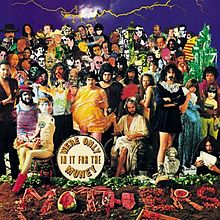Self-interest ‘wrongly understood’
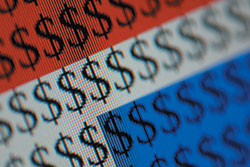
The gospel of prosperity vs. civil religion
By Bruce T. Murray
Author, Religious Liberty in America: The First Amendment in Historical and Contemporary Perspective
The ongoing worldwide financial crisis has called into question a core basis of America’s economic system: Belief that the unfettered pursuit of one’s self-interest will lead to the betterment of all. Instead, wealth has become increasingly concentrated in the hands of the wealthy few, while wages for the rest are stagnant or in decline.
“Those of us who have looked to the self-interest of lending institutions to protect shareholder’s equity – myself especially – are in a state of shocked disbelief,” Former Federal Reserve Chairman Alan Greenspan told the Congressional Committee of Government Oversight and Reform.
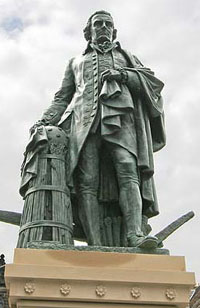 Adam Smith, the “founding father” of America’s economic system, had no illusions about the drawbacks of self-interest. Even self-interested economic behavior that confers benefits to the greater society does so only incidentally – “without intending it, without knowing it,” Smith wrote in his treatise, The Theory of the Moral Sentiments.
Adam Smith, the “founding father” of America’s economic system, had no illusions about the drawbacks of self-interest. Even self-interested economic behavior that confers benefits to the greater society does so only incidentally – “without intending it, without knowing it,” Smith wrote in his treatise, The Theory of the Moral Sentiments.
“The rich,” he said, act out of “natural selfishness and rapacity, though they mean only their own conveniency, though the sole end which they propose from the labours of all the thousands whom they employ, be the gratification of their own vain and insatiable desires.”
Smith rejected the notion that man alone – without God – was capable of creating a moral economic system. “The care of the universal happiness of all rational and sensible beings, is the business of God and not of man. To man is allotted a much humbler department, but one much more suitable to the weakness of his powers, and to the narrowness of his comprehension; the care of his own happiness,” Smith wrote.
America's economic philosophy bumps into another national belief system known as civil religion – Americans’ sense of connection between themselves, the state, and a higher authority. Central to civil religion is the idea that the American experience is part of a divine plan – overseen by God – and with God's approval.
 John Winthrop, a founder of the Massachusetts Bay Colony, laid out his vision of the new civic and religious order in his landmark sermon, A Model of Christian Charity, delivered to his group of colonists before disembarking to their new world in 1630:
John Winthrop, a founder of the Massachusetts Bay Colony, laid out his vision of the new civic and religious order in his landmark sermon, A Model of Christian Charity, delivered to his group of colonists before disembarking to their new world in 1630:
“Thus stands the cause between God and us. We are entered into covenant with Him for this work. We have taken out a commission ... For we must consider that we shall be as a city upon a hill. The eyes of all people are upon us.”
These familiar words have been echoed ever since by presidents and politicans – and they speak to a widespread article of faith: The American experience is an expression of divine providence, and this special destiny is still in the process of being fulfilled.
While one reading of civil religion might interpret prosperity as a blessing from God, the pursuit of prosperity alone, without God, is a form of idolatry. Even before Winthrop's colonists set up shop in Boston, Winthrop warned about the dangers of unbridled greed and self-indulgence:
“If our hearts shall turn away, so that we will not obey, but shall be seduced, and worship other Gods, our pleasure and profits, and serve them; it is propounded unto us this day, we shall surely perish out of the good land whither we pass over this vast sea to possess it.”
Tension between the gospel of prosperity and civil religion has existed from colonial times to the present – and is nowhere is it more evident than in the ongoing economic crisis, the Wall Street protests and rebukes of the protesters. The protesters call for entry to the “city on a hill” and access to its benefits, while their detractors say they must earn their place. After all, Winthrop's people worked hard to build their city; they didn't complain.
The seeds of both views can be found in the 17th century Puritan mind, as echoed by Winthrop and his successors. Winthrop's message to his new Americans not a partisan view, but an attempt to mediate conflicting impulses. Civil religion is a common denominator for both the occupied and the occupiers of Wall Street.
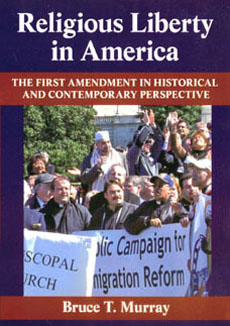
The University of Massachusetts Press Book, Religious Liberty in America: The First Amendment in Historical and Contemporary Perspective by Bruce T. Murray, includes a comprehensive discussion on civil religion in American history and current events. Murray analyzes where laissez-faire economics comes into conflict with the civil religion and its cohort, “civic virtue” — so prized by America's founders.
Religious Liberty in America was selected by Choice – a publication of the Association of College and Research Libraries – as an “Outstanding Academic Book.”
“This book is a splendid presentation of the First Amendment – with civil religion as a parallel theme – especially as presently related to so many issues in American political and religious life. Other books on these issues have been appearing of late, but none as clear and thorough as this one.”
— G.H. Shriver, Professor Emeritus, Georgia Southern University
Purchase Religious Liberty in America on the University of Massachusetts Press Web site.
Read more about the author here.
References
‘The Principle of Self-Interest Rightly Understood’
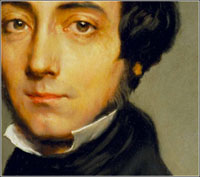 “The Americans are fond of explaining almost all the actions of their lives by the principle of self-interest rightly understood; they show with complacency how an enlightened regard for themselves constantly prompts them to assist one another and inclines them willingly to sacrifice a portion of their time and property to the welfare of the state.” — Alexis de Tocqueville, Democracy in America, Book 2, Chapter 8
“The Americans are fond of explaining almost all the actions of their lives by the principle of self-interest rightly understood; they show with complacency how an enlightened regard for themselves constantly prompts them to assist one another and inclines them willingly to sacrifice a portion of their time and property to the welfare of the state.” — Alexis de Tocqueville, Democracy in America, Book 2, Chapter 8
Independence and Providence
“We, therefore, the Representatives of the United States of America, in General Congress, Assembled, appealing to the Supreme Judge of the world for the rectitude of our intentions, do, in the Name, and by Authority of the good People of these Colonies, solemnly publish and declare ... and for the support of this Declaration, with a firm reliance on the protection of divine Providence, we mutually pledge to each other our Lives, our Fortunes and our sacred Honor.”
— The Declaration of Independence, 1776
The American work ethic
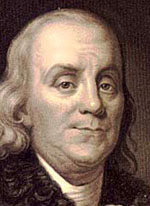 “If we are industrious we shall never starve; for, at the working man's house hunger looks in, but dares not enter. Nor will the bailiff nor the constable enter, for industry pays debts, while despair encreaseth them. ... If you were a servant, would you not be ashamed that a good master should catch you idle? Are you then your own master, be ashamed to catch yourself idle.” — Benjamin Franklin, “The Way to Wealth”
“If we are industrious we shall never starve; for, at the working man's house hunger looks in, but dares not enter. Nor will the bailiff nor the constable enter, for industry pays debts, while despair encreaseth them. ... If you were a servant, would you not be ashamed that a good master should catch you idle? Are you then your own master, be ashamed to catch yourself idle.” — Benjamin Franklin, “The Way to Wealth”
Capitalism and the Protestant ethic
“The earning of money within the modern economic order is, so long as it is done legally, the result and the expression of virtue and proficiency in a calling; and this virtue and proficiency are, as it is now not difficult to see, the real Alpha and Omega of Benjamin Franklin's ethic.” — Max Weber, The Protestant Ethic and the Spirit of Capitalism (Chapter II)
Capitalism and the Puritan mind
“We cannot well maintain that the pursuit of worldly goods, conceived as an end in itself, was to any of them of positive ethical value. ... The salvation of the soul and that alone was the centre of their life and work. Their ethical ideals and the practical results of their doctrines were all based on that alone, and were the consequences of purely religious motives.” — Max Weber, The Protestant Ethic and the Spirit of Capitalism (Chapter III)
Max Weber redux
“To paraphrase Max Weber, the connection between the pursuit of wealth and ethical meaning has come undone. Or as novelist Gore Vidal comments, Puritan virtue is dead and there is nothing to replace it.” — Robert Bachelder, Have Ethics Disappeared from Wall Street?
Puritan preaching
“A Christian should with PIETY follow his Occupation. ... But now, these things call for your Attention. First; Let not the Business of your Personal Calling swallow up the Business of your GENERAL CALLING. ... Forget not, O Mortal man, That thou hast an Immortal Soul to be provided for.” — Cotton Mather, “A Christian At His Calling” (1701)
Property rights – the ‘killer app’
Economist Niall Ferguson argues that the United States, unlike South Ameica, prospered due to the rule of law based on private property rights, which resulted in widespread property ownership in the U.S. In South America, by contrast, land is held onto by a tiny elite descended from the conquistadors.
The peril of success
“We'll succeed beyond our wildest dreams ... I think we also have to be prepared for the fact that we may, and probably will, overdo it.”
— Alan Greenspan in Maestro: Greenspan's Fed and the American Boom by Bob Woodward
The Looting of America
In 1970 the top 100 CEOs earned $45 for every $1 earned by the average worker. By 2006, the ratio climbed to 1,723 to one. (See graphs.) ... From 1947 until the mid-1970s real wages and productivity followed parallel upward curves. Around 1973, the lines diverge sharply: Productivity continues to climb, while wages stall and decline. The gap has continued to widen for almost 40 years. (See graph.) — Les Leopold, AlterNet, Oct. 23, 2011
News and analysis
Free enterprise ‘blessing’ humanity?
“Free enterprise has done more to bless humanity than any other economic system not only because it is the only system that creates a prosperous middle class, but also because it is the only system where the individual enjoys the freedom to guide and build his or her own life.” Mitt Romney said at the 2012 Clinton Global Initiative meeting.
Executive pay and bargaining power
 Executive pay a function of market forces? “When British economists David Ricardo and Adam Smith examined this question 200 years ago, they concluded that what a person earns is determined not by what the person has produced but by that person's bargaining power. It was Smith who explained that the bargaining power of each party is determined by the laws that the government passes and the way that it enforces them, and that, as a rule, the government sides with employers against employees.”
Executive pay a function of market forces? “When British economists David Ricardo and Adam Smith examined this question 200 years ago, they concluded that what a person earns is determined not by what the person has produced but by that person's bargaining power. It was Smith who explained that the bargaining power of each party is determined by the laws that the government passes and the way that it enforces them, and that, as a rule, the government sides with employers against employees.”
— Moshe Adler, Los Angeles Times, Jan. 4, 2010
JPMorgan Chase lobbied for loophole
Their goal was to obtain special breaks that would allow banks to make big bets in their portfolios, including some of the types of trading that led to the $2 billion loss now rocking the bank. Also see “Why We Regulate” by Paul Krugman
America becoming old Europe
A study by French economists Emmanuel Saez and Thomas Piketty tracks American income since 1913. “In a way, the United States is becoming like Old Europe, which is very strange in historical perspective,” Mr. Piketty said. “The United States used to be very egalitarian, not just in spirit but in actuality. Inequality of wealth and income used to be much larger in France.” Also see critique of Saez-Piketty study.
Rich get even richer
In 2010, as the nation continued to recover from the recession, a dizzying 93 percent of the additional income created in the country that year, compared to 2009 – $288 billion – went to the top 1 percent of taxpayers, those with at least $352,000 in income. — New York Times, March 25, 2012
U.S. lags in economic mobility
Americans enjoy less economic mobility than their peers in Canada and much of Western Europe. At least five large studies in recent years have found the United States to be less mobile than comparable nations. One reason for the mobility gap may be the depth of American poverty, which leaves poor children starting especially far behind. — New York Times, Jan. 4, 2012
Top 1 percent doubles income
From 1979 to 2007, average inflation-adjusted after-tax income grew by 275 percent for the 1 percent of the population with the highest income, according to a report by the Congressional Budget Office. — New York Times, Oct. 25, 2011
Moving from the top 1% to the top .1%
“The 99 percent slogan aims too low. A large fraction of the top 1 percent’s gains have actually gone to an even smaller group, the top 0.1 percent — the richest one-thousandth of the population.” — Paul Krugman, New York Times, Nov. 24, 2011
Why America Must Revive Its Middle Class
“America was once the great middle-class society. Now we are divided between rich and poor, with the greatest degree of inequality among high-income democracies. The top 1% of households take almost a quarter of all household income – a share not seen since 1929. An economy this lopsided cannot prosper.”
— Jeffrey D. Sachs, Time Magazine, Oct. 10, 2011
Trouble in the mother country
In 2005, about 30% of income in the United Kingdom went to the top 5% of earners, according to statistics from the International Monetary Fund. In no other major European country is so much concentrated in the hands of so few. But the ratio in the U.S. is worse: The IMF statistics show that more than 33% of American income goes to the top 5% of earners. — Nathan Thornburgh, Time Magazine, Aug. 22, 2011
Mitt Romney's job-creation history
As a partner and co-founder of Bain Capital, a leveraged-buyout firm, “Romney and his team maximized returns by firing workers, seeking government subsidies, and flipping companies quickly for large profits. Sometimes Bain investors gained even when companies slid into bankruptcy.” — Los Angeles Times, Dec. 3, 2011. Also see Romney's retirement deal.
Preying on the poor
“Buy Here Pay Here” used-car sales cater to low-income car buyers who can't get credit through normal channels. Seller-lenders command premium prices for road-worn vehicles and finance the sales at interest rates that can top 30%.
What Ever Happened To Upward Mobility?
“The simple truth is that we have a belief system about ourselves that no longer aligns with the facts.” — Isabel Sawhill, the Brookings Institution, Time Magazine, Nov. 14, 2011 Also see The Truth About the Poverty Crisis by Rana Foroohar.
‘Zombie banks’
The Troubled Asset Relief Program (TARP) pumped $700 billion into the U.S. banking system, but the banks aren't lending. — Stephen Gandel, Time Magazine, Sept. 26, 2011
Commentary
‘Gilded Age back with a vengeance’

Veteran journalist Bill Moyers offers his perspective on how the United States reached its present state of have-and-have-not: “We know what all this money buys. Americans have learned the hard way that when rich organizations and wealthy individuals shower Washington with millions in campaign contributions, they get what they want.”
Rags to riches – only for the few
David Brooks of the New York Times critiques the “rampant hyperindividualism and Ayn Rand-influenced gospel of wealth” espoused by the political right.
Pathos of the Plutocrat
“Not only do many of the superrich feel deeply aggrieved at the notion that anyone in their class might face criticism ... But never mind. Because the rich are different from you and me ... They don’t even see how funny it is — how ridiculous they look — when they attribute the weakness of a $15 trillion economy to their own hurt feelings. After all, who’s going to tell them? They’re safely ensconced in a bubble of deference and flattery.” — Paul Krugman, New York Times, July 19, 2012
Meritocracy without morality
Today’s elite is more talented and open than in the past, but lacks a self-conscious leadership code of the old WASP establishment, according to David Brooks of the New York Times. The language of meritocracy (how to succeed) has eclipsed the language of morality (how to be virtuous). Also, Paul Krugman's take on the V.I.P. meritocracy.
Laissez-faire to the extreme
While some have a deep faith in the ability of markets to create optimal solutions, is it morally permissable for an online casino to pay a woman $10,000 to tattoo its Web site on her forehead? It happened in Utah. — Nicholas Kristof, New York Times, May 31, 2012
The emerging underclass
Charles Murray’s book, “Coming Apart,” examines the social dimensions of the decline of America's working class. — Nicholas Kristof, New York Times, Feb. 9, 2012
America's caste system
Since the 1960s, “the country has bifurcated into different social tribes, with a tenuous common culture linking them.” — David Brooks analyzes Charles Murray’s “Coming Apart,” New York Times, Jan. 31, 2012.
Inequality damages social fabric
According to the bipartisan Congressional Budget Office, for the highest-income 1% of the population, average after-tax household income almost quadrupled from 1979 to 2007, while income for the 60% of Americans in the middle of the scale grew by just over one-third. “Middle-class stagnation is the proper concern of government because of the damage it does to the social fabric as well as to economic growth.” — Michael Hiltzik, Los Angeles Times, Dec. 31, 2011
Economics and religion
In his landmark “God and Man at Yale,” William F. Buckley Jr. depicted the world as engaged in an existential struggle between good and evil, and true religion. Christianity and laissez-faire economics were essentially intertwined and part of the good. As Buckley saw it, John Maynard Keynes was not merely incorrect in arguing that some governmental regulation of the economy was desirable. He was leading the West down a path to perdition. -- Carl T. Bogus, Los Angeles Times, Nov. 27, 2011
What the Free Market Needs
“A bit of intellectual honesty is required of free-market economists. Free markets work splendidly, in theory. But as no less a free marketer than the great Adam Smith himself observed in The Theory of Moral Sentiments – the book that preceded The Wealth of Nations – in application, free markets rely on specific social, moral and political institutions. These institutions must be exceedingly robust if the free market is to deliver on all of the splendid promises made for it.” — Claire Berlinski, Los Angeles Times, Oct. 21, 2008
Reassessing the rich
“For decades, the wealthy have been held up as people to be admired, victors in the Darwinian economic struggle by virtue of their personal ingenuity and hard work. ...
That mind-set has all but been eradicated by the damage sustained by the average worker's nest egg, combined with the spectacle of bankers and financial engineers maintaining their lifestyles with multimillion-dollar bonuses while the submerged 99% struggle for oxygen.”
— Michael Hiltzik, Los Angeles Times March 19, 2009
‘Rapacious lending practices’
“The banking industry wasted no time last week declaring its opposition to President Obama's proposal for a regulatory agency that would protect consumers from rapacious lending practices.” — David Lazarus, Los Angeles Times, June 21, 2009
Peter Drucker on the profit motive
Economics philosopher Peter Drucker said profit fails as an explanation of a businessman's behavior “or his guide to right action.” Moreover, a narrow view of the corporation's role inspires the hostility toward profit that is “among the most dangerous diseases of an industrial society.” — Michael Hiltzik, Los Angeles Times, Dec. 31, 2009
In defense of luxury
Column by Donald J. Kochan
Class warfare in popular culture
‘We can't help ourselves’
Jeremy Irons waxes over the history of destructive Wall Street behavior in “Margin Call.”
Ali Baba Bunny
Daffy Duck strikes it rich.
Spïnal Tap — “Give Me Some Money”
Lyrics
“Old lady judges watch people in pairs,
Limited in sex, they dare
To push fake morals, insult and stare,
While money doesn’t talk, it swears ...”
— Bob Dylan, “It's Alright, Ma (I'm Only Bleeding)”
“You think you're so clever and classless and free,
But you're still f---ing peasants as far as I can see.”
— John Lennon, “Working Class Hero”
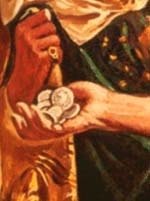 “I have no thought at all about my own reward;
“I have no thought at all about my own reward;
I really didn't come here of my own accord.
...
On Thursday night you'll find him where you want him –
Far from the crowds in the Garden of Gethsemane.”
— Judas in Jesus Christ Superstar
“Could you tell a wise man,
By the way he speaks or spells?
Is this more important,
Than the stories that he tells?
And call a man a fool,
If for wealth he doesn't strive?”
— The Yardbirds, “Mr, You're a Better Man Than I”
The Kinks — Lola Vs. the Powerman and the Money-Go-Round
Dead Kennedys — “Kill the Poor”
Black Sabbath — “Lord of This World”
David Bowie — “The Man Who Sold the World”
Jimi Hendrix — “If Six was Nine”
Peter Gabriel — “Don't Give up”
Animals and avarice
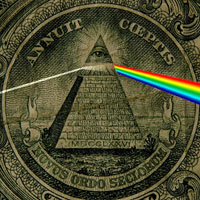
“And after a while, you can work on points for style –
Like the club tie, and the firm handshake,
A certain look in the eye and an easy smile.
You have to be trusted by the people that you lie to,
So that when they turn their backs on you,
You'll get the chance to put the knife in.”
— Roger Waters, “Dogs”
“Big man, pig man – ha-ha charade you are.
You well heeled big wheel – ha ha charade you are.
And when your hand is on your heart –
You're nearly a good laugh, almost a joker,
With your head down in the pig bin,
Saying, ‘Keep on digging.’
Pig stain on your fat chin.
...
You've got to stem the evil tide,
And keep it all on the inside.”
— Roger Waters, “Pigs”
“What do you get for pretending the danger's not real?
Meek and obedient you follow the leader
Down well trodden corridors into the valley of steel.
What a surprise – a look of terminal shock in your eyes.
Now things are really what they seem;
No, this is no bad dream.”
— Roger Waters, “Sheep”



